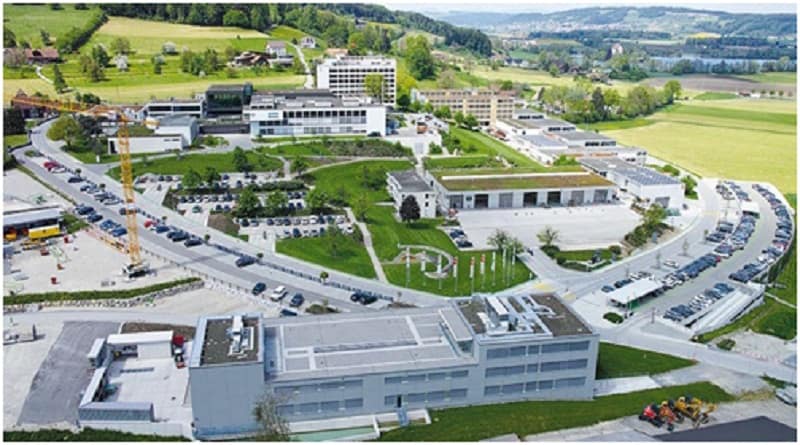"A beacon in the industry"
From master plan to living business excellence: this is how the Sursee Campus has been describing the path it has taken with the EFQM model since 2015.

Anyone in the construction industry who completes higher vocational training today is probably familiar with "Campus Sursee". Every year, 15,000 participants complete further training at the Construction Training Centre. But other organisers of conferences, courses, seminars, etc. also find a top infrastructure at the Campus Sursee Seminar Centre. The owner of the Bildungszentrum Bau AG and the Seminarzentrum AG is the Campus Sursee Foundation. The purpose of the foundation is, according to its own statements, "the sustainable strengthening of education and training and thereby the profiling of the main construction trade".
Change of strategy for better capacity utilisation
The Construction Training Centre was the brainchild of the Swiss Association of Master Builders. The association wanted to create a training centre for the whole of Switzerland. In 1972, this idea became reality: the Sursee campus opened its doors. Until the 2000s, thousands of budding construction specialists - bricklayers, road builders, construction managers, etc. - were "channeled" through the training center. But the catering and seminar infrastructure, which was already good at the time, needed to be used to even greater capacity. So in 2006 a change of strategy took place: the Sursee Campus became a seminar and conference centre and with the sports arena, which opened two months ago, the Sursee Campus has set a further milestone. It is thus establishing itself both in the professional sports sector as a training and competition location and in popular sports as a public sports facility for associations, schools and the region.
Development on a sustainable basis
Major investments were associated with this change, and not only in terms of construction. A clear process management system in accordance with the ISO 9001 standard was also introduced. The company culture was also to develop positively. "The EFQM model is excellently suited for this purpose," says Thomas Stocker, Managing Director of Bildungszentrum Bau AG. As part of his own MAS graduation, he dealt with the practical implementation of this model in his final thesis (see interview). Today, the Sursee campus is "excellent" in a variety of areas: a - in the words of Thomas Stocker - almost "suspiciously low" staff turnover due to high employee satisfaction or the highest standards in ecology are just a few examples. The Swiss Federal Office of Energy (SFOE) recently awarded the Sursee campus the "2000-Watt Site" certificate. This certification is also the result of a goal that was the basis for all expansion and renovation plans: to improve continuously and sustainably.
In conversation: Thomas Stocker, Managing Director Bildungszentrum Bau AG
Mr Stocker, what does the term "excellence" mean to you?
For me, excellence means exceeding the customer's expectations. Furthermore, it is also about being able to develop entrepreneurial freedom through excellence.
Campus Sursee has been working according to the EFQM model since 2015. In 2017, you already reached the R4E**** level and have now been nominated for the award. So you are quite "sporty" on the road.
It's always a question of where you start. In 2015, we carried out an initial maturity assessment and found that we were already at a high level: We are already at a high level. That's why it made sense to set the award as a goal. But I would like to make it clear: We are not pursuing excellence for the sake of the model, but for the sustainable development of the company.
What challenges have you been able to overcome "better" thanks to the model?
The model facilitates the commitment to continuous improvement. But the biggest hurdle for us, too, was: how do we get the understanding for this down to all employees? In any case, we succeeded in getting the employees to think for themselves. Everyone was able to get involved. The reports on our self-assessment also supported us in this.
Nevertheless, the EFQM model still has the reputation of being too complex for many people.
Of course, the basics of the model are written in a language that is hardly comprehensible to "ordinary" employees. My initial experience also showed that the PDCA circle, for example, took time to be implemented consistently, even in management.
And today the model facilitates the recertification of ISO standards?
That is indeed the case. It should not be forgotten that the ISO standards are a relatively static matter; they define what has to be fulfilled. But I don't see ISO and EFQM as two competing systems, because - used correctly - they interlock.
To what extent do you see the EFQM model as a good means of remaining competitive in your industry?
I am convinced of this. I see the Sursee campus as a beacon in our industry. It shows that sustainable work is also being done in the construction industry. Many companies in the construction sector are ISO-certified. It would make sense to integrate the model more into the training of construction specialists. The Association of Master Builders has already started to think about this. Personally, I can recommend every company to introduce the EFQM model. In the meantime there are many good training courses to get the tools for it. But it remains important: It is essential to involve the employees!









